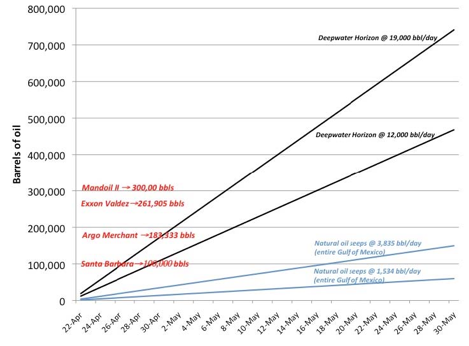Image from source, Bear Market Investments
A lot of conservatives (even a friend of mine) have tried to make light of the massive BP Deep Water Horizon disaster in the Gulf of Mexico. They say that the ocean has many natural underwater oil and gas leaks, and that nature just takes care of it on its own. This to me seems incredibly naive, and something akin to denial. But I'll confess that I had no idea just how much does leak naturally. So they'd seem to have a point, right?
Sort of, but not really. There's a big difference between a slow seepage, and a massive geyser. And the stuff that's starting to wash up on the Gulf coast would belie their denials. So, I found this nifty site that explains the difference.
[Excerpt]
Natural Oil Seeps and the Deepwater Horizon Disaster: A Comparison of Magnitudes
Some reports in the media attempt to downplay the significance of the release of oil from the Deepwater Horizon accident by arguing that natural oil seeps release large volumes of oil to the ocean, so why worry? Lets look at the numbers.
Natural seeps can be thought of as natural springs from which liquid and gaseous hydrocarbons (hydrogen-carbon compounds) leak out of the ground. Oil seeps are fed by natural underground accumulations of oil and natural gas. Satellite images have identified hundreds of areas where oil is likely to seep from the Earth’s crust into the waters of the Gulf of Mexico. . .
Read more at: Bear Market Investments


No comments:
Post a Comment
Have something to say to us? Post it here!